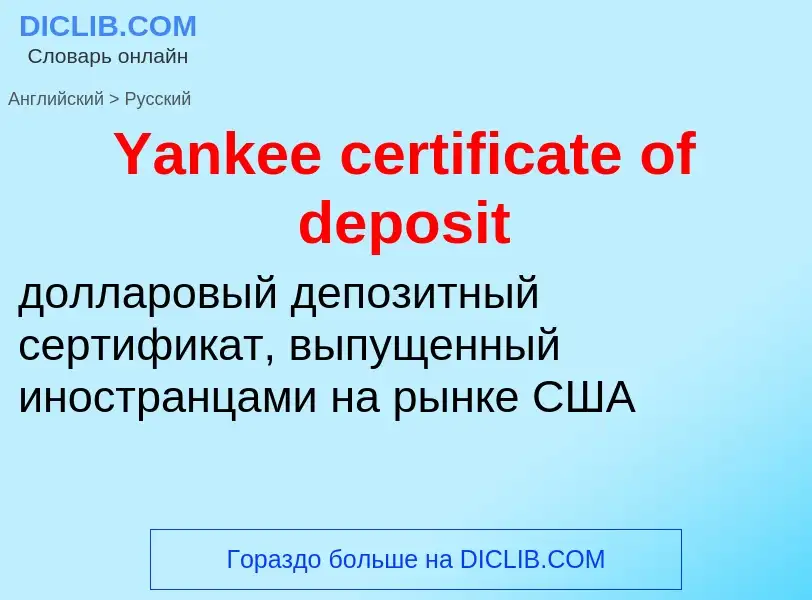Tradução e análise de palavras por inteligência artificial ChatGPT
Nesta página você pode obter uma análise detalhada de uma palavra ou frase, produzida usando a melhor tecnologia de inteligência artificial até o momento:
- como a palavra é usada
- frequência de uso
- é usado com mais frequência na fala oral ou escrita
- opções de tradução de palavras
- exemplos de uso (várias frases com tradução)
- etimologia
Yankee certificate of deposit - tradução para russo
авиация
свидетельство летной пригодности
Definição
.
Wikipédia
A certificate of deposit (CD) is a time deposit sold by banks, thrift institutions, and credit unions in the United States. CDs typically differ from savings accounts in that the CD has a specific, fixed term before money can be withdrawn without penalty and generally higher interest rates. The bank expects the CD to be held until maturity, at which time they can be withdrawn and interest paid.
In the United States, CDs are insured by the Federal Deposit Insurance Corporation (FDIC) for banks and by the National Credit Union Administration (NCUA) for credit unions.
In exchange for the customer depositing the money for an agreed term, institutions usually offer higher interest rates than they do on accounts that customers can withdraw from on demand—though this may not be the case in an inverted yield curve situation. Fixed rates are common, but some institutions offer CDs with various forms of variable rates. For example, in mid-2004, interest rates were expected to rise—and many banks and credit unions began to offer CDs with a "bump-up" feature. These allow for a single readjustment of the interest rate, at a time of the consumer's choosing, during the term of the CD. Sometimes, financial institutions introduce CDs indexed to the stock market, bond market, or other indices.
Some features of CDs are:
- A larger principal should/may receive a higher interest rate.
- A longer term usually earns a higher interest rate, except in the case of an inverted yield curve (e.g., preceding a recession).
- Smaller institutions tend to offer higher interest rates than larger ones.
- Personal CD accounts generally receive higher interest rates than business CD accounts.
- Banks and credit unions that are not insured by the FDIC or NCUA generally offer higher interest rates.
CDs typically require a minimum deposit, and may offer higher rates for larger deposits. The best rates are generally offered on "Jumbo CDs" with minimum deposits of $100,000. Jumbo CDs are commonly bought by large institutional investors, such as banks and pension funds, that are interested in low-risk and stable investment options. Jumbo CDs are also known as negotiable certificates of deposits and come in bearer form. These work like conventional certificate of deposits that lock in the principal amount for a set timeframe and are payable upon maturity.
The consumer who opens a CD may receive a paper certificate, but it is now common for a CD to consist simply of a book entry and an item shown in the consumer's periodic bank statements. That is, there is often no "certificate" as such. Consumers who want a hard copy that verifies their CD purchase may request a paper statement from the bank, or print out their own from the financial institution's online banking service.

